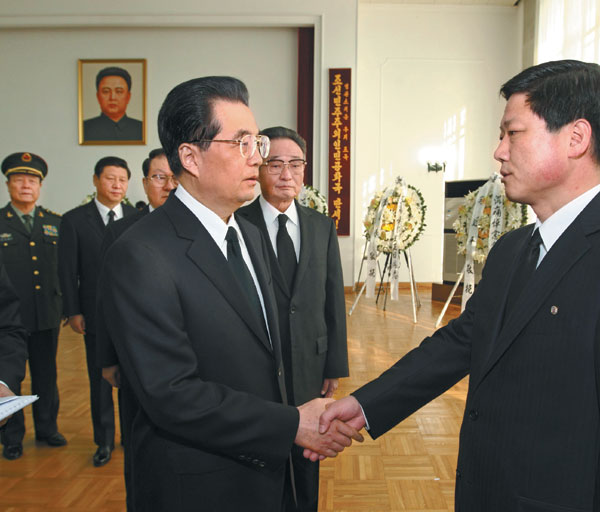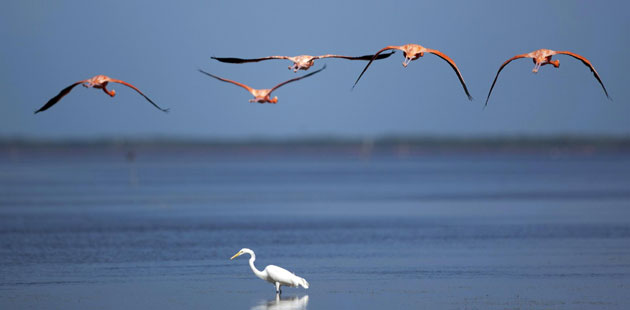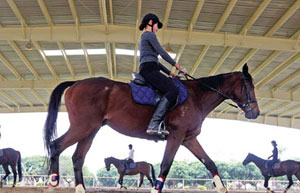Hu stresses DPRK friendship, offers condolences
Updated: 2011-12-21 07:28
(China Daily)
|
|||||||||
President visits embassy to offer condolences
BEIJING - President Hu Jintao reiterated on Tuesday that maintaining and developing the traditional friendship with the Democratic People's Republic of Korea (DPRK) is an unwavering policy, as he offered condolences over the death of DPRK leader Kim Jong-il.
|
 |
|
President Hu Jintao conveys his condolences on Tuesday to Pak Myong-ho, charge d'affaires at the Democratic People's Republic of Korea (DPRK) embassy in Beijing, over the death of DPRK leader Kim Jong-il. [Photo/Xinhua] |
Hu visited the DPRK embassy in Beijing to pay his respects a day after the DPRK announced Kim's death from a heart attack on a train during a field tour on Saturday.
Hu spoke highly of Kim's contribution to the development of the DPRK and promised China's continued friendship with Pyongyang under the new leader, Kim Jong-un.
"We are confident that the people of the DPRK will carry on the task bequeathed by Comrade Kim Jong-il, and closely unify around the Workers' Party of Korea, and under Comrade Kim Jong-un to turn their sorrow into strength," Hu said.
Three other members of the Standing Committee of the Political Bureau of the Communist Party of China Central Committee - Wu Bangguo, Li Changchun and Xi Jinping - accompanied Hu to the embassy.
Foreign Ministry spokesman Liu Weimin said on Tuesday that China is open for the DPRK's new leader to visit, noting that China maintains high-level exchanges with the DPRK.
"We would welcome the DPRK leaders to visit China at their convenience," Liu said.
Also on Tuesday, Foreign Minister Yang Jiechi spoke by phone with US Secretary of State Hillary Clinton and Republic of Korea (ROK) Foreign Minister Kim Sung-hwan.
Yang said safeguarding peace and stability on the Korean Peninsula serves the common interests of all parties and China is ready to work with them toward that end.
Agreeing on the importance of maintaining peace and stability on the peninsula, both Clinton and Kim Sung-hwan said their countries will maintain close communication and coordination with China, according to Liu.
Kim Jong-il's body was lying in state in a memorial palace on Tuesday as weeping mourners filled public plazas.
The ROK sent condolences on Tuesday to the DPRK people over the death of Kim.
Seoul will not send a government delegation to Pyongyang, but the families of the ROK's late president Kim Dae-jung and of former Hyundai Group chairman Chung Mong-hun, will be allowed to attend the funeral on Dec 28, said Unification Minister Yu Woo-ik. Kim Dae-jung and Kim Jong-il held the first DPRK-ROK summit in 2000 and the Hyundai Group pioneered cross-border business exchanges.
Yu said he hopes the DPRK returns to stability as soon as possible so that the ROK and the DPRK can cooperate for peace and prosperity on the Korean Peninsula.
The US offered "thoughts and prayers" in the wake of Kim's death. It was ready to help the DPRK people and urged the new leadership to work with the international community to usher in a new era of peace, prosperity and lasting security on the Korean Peninsula, Clinton said in a statement late on Monday.
Experts said stability of the peninsula is the top priority for countries, including China.
China's diplomatic efforts are to ensure the smooth transition of power in the DPRK and the stability of the Korean Peninsula, said Wang Junsheng, an expert on Asian studies at the Chinese Academy of Social Sciences.
The DPRK, during the transition of power, needs support from the international community, especially China, Wang said, adding that this is also an opportunity for countries to improve ties with the DPRK.
"It's clear that the ROK and Japan could take this chance to better relations with the DPRK. The US is also unlikely to provoke tension with the DPRK," he said.
The immediate support from Chinese leaders assured the DPRK that China is a reliable friend and committed to the Korean Peninsula's peace and stability, which is also in China's interest, he said.
Xinhua and AFP contributed to this story.











